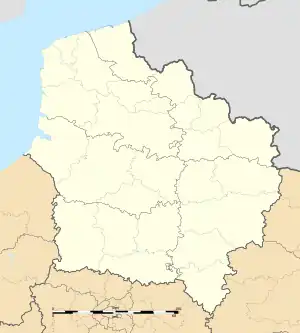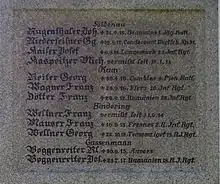Combles
Combles (French pronunciation: [kɔ̃bl] ⓘ) is a commune in the Somme department in Hauts-de-France in northern France.
Combles | |
|---|---|
 The town hall in Combles | |
 Coat of arms | |
Location of Combles | |
 Combles  Combles | |
| Coordinates: 50°00′36″N 2°51′58″E | |
| Country | France |
| Region | Hauts-de-France |
| Department | Somme |
| Arrondissement | Péronne |
| Canton | Péronne |
| Intercommunality | Haute Somme |
| Government | |
| • Mayor (2020–2026) | Betty Sorel[1] |
| Area 1 | 9.87 km2 (3.81 sq mi) |
| Population | 739 |
| • Density | 75/km2 (190/sq mi) |
| Time zone | UTC+01:00 (CET) |
| • Summer (DST) | UTC+02:00 (CEST) |
| INSEE/Postal code | 80204 /80360 |
| Elevation | 83–153 m (272–502 ft) (avg. 30 m or 98 ft) |
| 1 French Land Register data, which excludes lakes, ponds, glaciers > 1 km2 (0.386 sq mi or 247 acres) and river estuaries. | |
Geography
Combles is situated on the D20 road, some 50 km (31 mi) north-east of Amiens.
History

Combles after its capture in 1916 by British and French troops
Combles was the operations centre for the battle of Bapaume during the Franco-Prussian War of 1870–71.
Combles was again at the centre of much fighting during World War I (1914–1918), with many of its buildings damaged and many of its residents injured or killed, not to mention the numerous casualties among the forces in combat there. Many British soldiers who fell in the war are buried in the local cemetery, and there are numerous war cemeteries in the immediate surrounding area.
It has, however, been substantially developed since the war's end.
Population
| Year | Pop. | ±% p.a. |
|---|---|---|
| 1968 | 691 | — |
| 1975 | 661 | −0.63% |
| 1982 | 648 | −0.28% |
| 1990 | 617 | −0.61% |
| 1999 | 676 | +1.02% |
| 2007 | 707 | +0.56% |
| 2012 | 795 | +2.37% |
| 2017 | 765 | −0.77% |
| Source: INSEE[3] | ||
See also
References
- "Répertoire national des élus: les maires". data.gouv.fr, Plateforme ouverte des données publiques françaises (in French). 2 December 2020.
- "Populations légales 2020". The National Institute of Statistics and Economic Studies. 29 December 2022.
- Population en historique depuis 1968, INSEE
External links
Wikimedia Commons has media related to Combles.
- Combles on the Quid website (in French)
This article is issued from Wikipedia. The text is licensed under Creative Commons - Attribution - Sharealike. Additional terms may apply for the media files.
